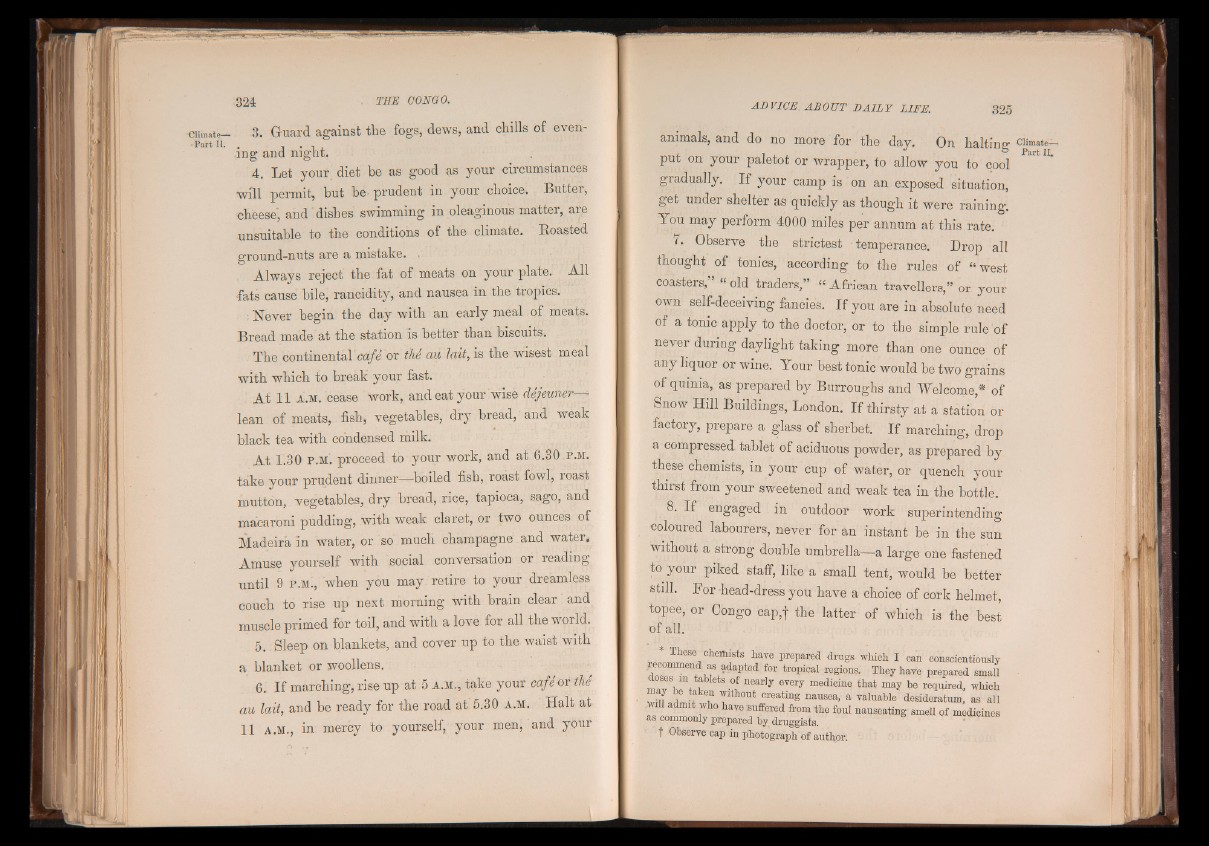
■climate— 3. Guard against the fogs, dews, and chills of evening
and night. .
4. Let your diet be as good as your circumstances
will permit, but he- prudent in your choice. Butter,
cheese, and dishes swimming in oleaginous matter, are
unsuitable to the conditions of the climate. Roasted
ground-nuts are a mistake. .
Always reject the fat of meats on your plate. All
•fats cause bile, rancidity, and nausea in the tropics.
: Never begin the day with an early meal of meats.
Bread made at the station is better than biscuits.
The continental café or thé au lait, is the w'isest meal
with which to break your fast.
At 11 a .m . cease work, a n d eat your wise déjeunerb g
lean of meats, fish, vegetables, dry . bread, and weak
black tea with condensed milk.
A t 1.30 p .m . proceed to your work, and at 6.30 p.m.
take your prudent dinner-—boiled fish, roast fowl, roast
mutton, vegetables, dry bread, rice, tapioca, sago, and
macaroni pudding, with weak claret, or two ounces of
Madeira in water, or so much champagne and water.
Amuse yourself with social conversation or reading
nntil 9 p .m ., when you may retire to your dreamless
couch to rise up next morning with brain clear and
muscle primed for toil, and with a love for all the world.
5. Sleep on blankets, and cover up to the waist with
a blanket or woollens.
6. If marching, rise up at 5 a .m ., take your eafe or thé
au lait, and be ready for the road at 5.30 a .m . Halt at
11 a .m ., in mercy to yourself, your men, and your
animals, and do no more for the day. On halting
put on your paletot or wrapper, to allow you to cool
gradually. I f your camp is on an exposed situation,
get under shelter as quickly as though it were raining.
You may perform 4000 miles per annum at this rate.
7. Observe the strictest temperance. Drop all
thought of tonics, according to the rules of “ west
coasters, “ old traders,” “ African travellers,” or your
own self-deceiving fancies. If you are in absolute need
of a tonic apply to the doctor, or to the simple rule of
never during daylight taking more than one ounce of
any liquor or wine. Your best tonic would be two grains
of quinia, as prepared by Burroughs and Welcome,* of
Snow Hill Buildings, London. I f thirsty at a station or
factory, prepare a glass of sherbet. If marching, drop
a compressed tablet of aciduous powder, as prepared by
these chemists, in your cup of water, or quench your
thirst from your sweetened and weak tea in the bottle.
8. If engaged in outdoor work superintending
coloured labourers, never for an instant he in the sun
without a strong double umbrella—a large one fastened
to your piked staff, like a small tent, would be better
still. For head-dress you, have a choice of cork helmet,
topee, or Congo cap,f the latter of which is the best
of all.
* These chemists have prepared drugs which I can conscientiously
y.commend as adapted for tropical regions. They have prepared small
“ 1 ,, lets of Dearh OTery medicine that may be required, which
ay be taken without creating nausea, a valuable desideratum, as all
will admit who have Buffered from the foul nauseating smell of medicines
as commonly prepared by druggists,
t Observe cap in photograph of author.